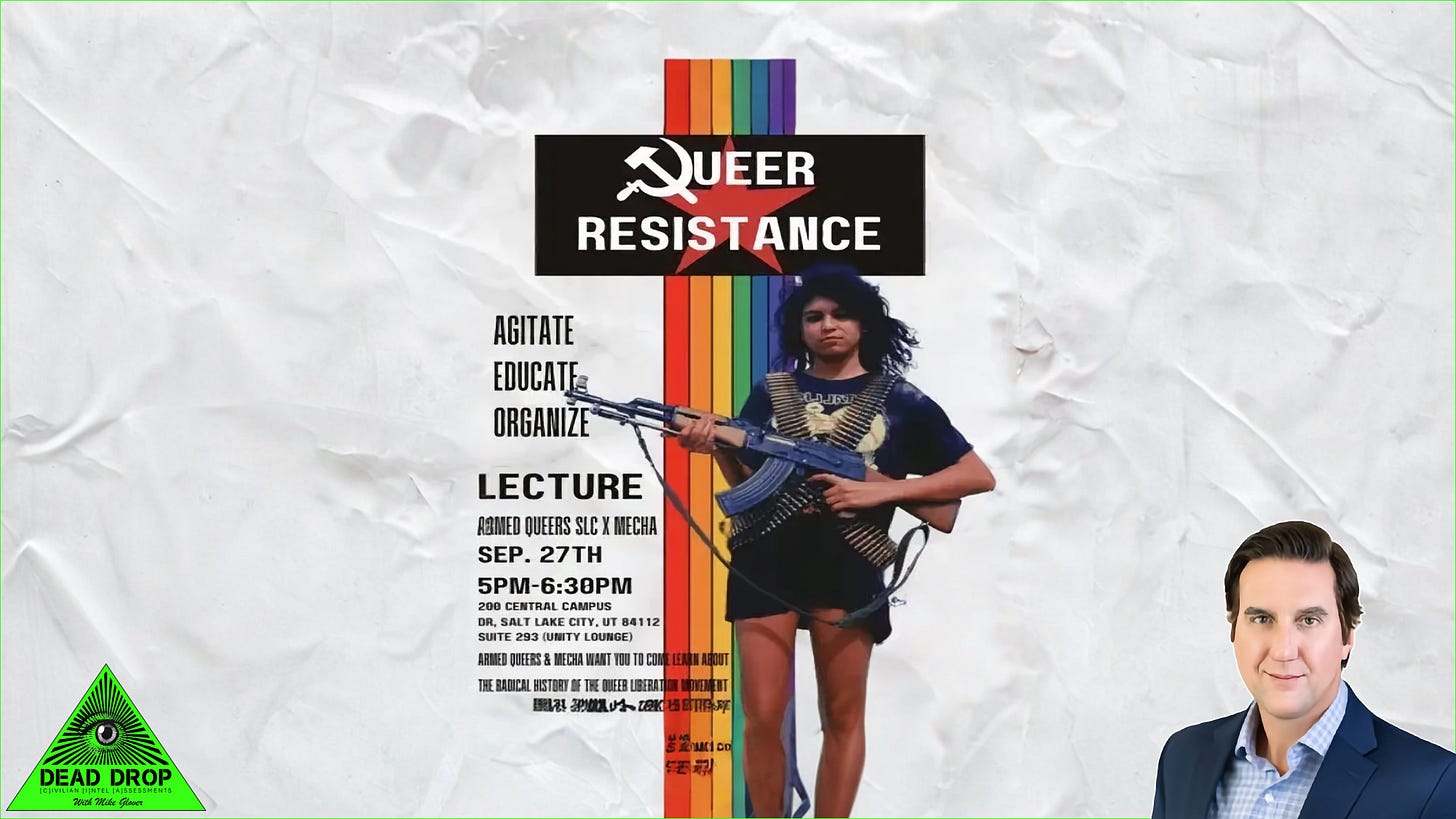Why Conservative Leaders Are Facing Heightened Threats
Political violence in 2025 is a one-way street
America’s political climate has entered one of the most polarized periods in living memory. Public figures on both sides of the cultural divide now face unprecedented levels of hostility, harassment, and direct threats. Conservative leaders, in particular, have become prime targets and are subjected to relentless online vitriol and increasingly exposed to physical danger. The rise in death threats, a string of high-profile assassination attempts, and most recently, a successful assassination just a couple of weeks ago, all point to a heightened threat environment that can no longer be ignored.
The U.S. Secret Service and FBI have both documented a steady rise in the number of threat cases they investigate each year. Political leaders, religious conservatives, and outspoken commentators are often singled out because of their visibility and the symbolism attached to their positions. For conservatives, who frequently speak out on issues such as abortion, gender identity, and religious freedom, the threats are both personal and ideological.
Keep reading below the thumbnail …
DISCLOSURE: This post contains affiliate links. If you make a purchase through them, we may earn a small commission at no extra cost to you. This helps keep our work independent. Thank you for your support.
Why Conservatives Are at Greater Risk Today
Conservative leaders today face greater risks than in the past due to a combination of cultural, social, and political dynamics. Their positions on faith, family, and morality place them at the center of debates, which makes them highly visible targets for extremists on the far left. For those who oppose these values, silencing conservative voices becomes a symbolic victory. The rise of conservative thought across national media platforms, popular podcasts, and campus organizations has only heightened this visibility, giving leaders a broader reach, but also exposing them to greater danger.
This threat environment is further intensified by the copycat effect that often follows high-profile attacks. The assassination of Charlie Kirk and the repeated attempts on former President Donald Trump demonstrate how one act of violence can inspire others who are unstable or seeking notoriety. History shows that when one public figure is targeted, others within the same space inevitably face a higher level of risk.
Use CODE: EATMEAT to get 10% off
Do you want to get a care package of CarniVault meat and merch for FREE, and possibly earn a few bucks? If you have a decent social media following, email the URLs to your socials to Chris@DeadDropIntel.org. and we'll consider adding you to our influencer program.
At the same time, the polarization of American politics has led to a culture of dehumanization. Opponents are no longer viewed as fellow citizens but as enemies, making calls for violence easier for radicals to justify. Yet it is important to remember that conservative leaders do not deserve to be attacked simply because they advocate strongly for their beliefs. Their work is expressed through speech, civic engagement, and political participation—not physical harm. Charlie Kirk himself set an example by welcoming civil debate, respecting those who disagreed with him, and focusing on ideas rather than personal attacks. His approach proved that principled disagreement can remain civil without spiraling into violence.
The Role of Extremist Rhetoric
It is important to stress that the majority of Americans, whether conservative, liberal, or otherwise reject violence. However, extremist rhetoric on the far left has included open fantasies about harming conservative leaders. Comments about “getting rid of Trump by any means necessary,” or online chatter celebrating violence against conservative speakers, fuel a toxic environment.
According to new YouGov polling, almost one in four Americans identifying as “very liberal” (24 percent) believe it is acceptable to celebrate a political opponent’s death. This chilling statistic highlights just how far some have drifted into normalizing violence as a political response.
This rhetoric also finds a powerful amplifier in online communities. Private chats and forums on platforms such as Discord and Reddit often become echo chambers where anger festers, misinformation spreads unchecked, and violent fantasies are encouraged. As a result, extremists are able to recruit, reinforce one another’s grievances, and build momentum toward real-world violence.
As we speak, the FBI is investigating a group known as Armed Queers Salt Lake City. Authorities are examining possible links between the Charlie Kirk shooting suspect, Tyler Robinson, and other networks, including indications of potential foreknowledge shared through Discord and Steam group chats.
Armed Queers Salt Lake City is a self-described socialist LGBTQ+ organization founded in 2020 in Salt Lake City, Utah, during the wave of protests that followed George Floyd’s death. The group identifies itself as a militant collective dedicated to arming and training queer, trans, and gender-nonconforming individuals for self-defense against perceived oppression. Its ideology promotes Marxist-Leninist principles, anti-capitalism, and revolutionary tactics. Their activities have included firearms training, community workshops, and political agitation, often carried out in coordination with other leftist groups.
The organization’s leader, Ermiya Fanaeian, was photographed on stage with Senator Elizabeth Warren at a 2019 political event. This connection was uncovered through a reverse-image search that points to a past political association and raises questions about Warren’s relationship with Fanaeian. In light of this history, the rapid escalation of these groups into what is increasingly being recognized as the new face of domestic terrorism underscores the need for their activities to be taken seriously and addressed with urgency.
Lessons from Recent Incidents
The assassination of Charlie Kirk sent shockwaves through conservative and religious communities. Regardless of political affiliation, the killing of a nationally recognized commentator is a sobering reminder that boundaries once considered unthinkable are now being crossed. His death is not only a personal tragedy but also a warning sign that public figures who engage in cultural and political debates face unprecedented dangers.
Furthermore, the video of the Charlie Kirk shooting circulating online was horrific, and the general public should not be exposed to material like that. Graphic footage can retraumatize victims’ families, desensitize viewers, and create a perverse incentive structure where attackers seek notoriety through viral violence.
As someone who has served overseas in combat environments, I have witnessed similar acts of brutality. I can say unequivocally that this is not something the public should ever become normalized to. Americans are beginning to show signs of desensitization, and some people even fantasize about killing as if it were acceptable retaliation. This normalization of violence corrodes civic life and makes the protection of public figures all the more urgent.
https://www.complianttechnologies.net/
Professional Security Recommendations
From a security standpoint, the current environment demands a higher standard of protection. Conservative leaders and organizations should strongly consider contracting with professional security companies that specialize in comprehensive executive protective services. These firms must be capable of developing tailored strategies that account for the client’s specific risk profile and operational environment.
The first step is to conduct in-depth threat assessments. Every client should have an individualized profile that reflects their public visibility, any history of past threats, current online chatter, and the nature of upcoming events. Social media accounts should also be monitored and analyzed for current threats, since online activity often provides early warning signs of potential danger. These assessments allow security teams to anticipate risks rather than simply react to them.
Equally important is performing thorough security advances before speeches or events, as conducting a professional advance is paramount. Ninety percent of effective security comes down to how detailed the advance plan is before the event begins. Protective teams must survey each location in advance, identify vulnerabilities, and create comprehensive contingency plans to address a wide range of scenarios.
Specialized protective measures should also be integrated into every aspect of the operation, including K9 bomb-dog sweeps to clear venues, denying potential key avenues of approach to hostile actors, and closely monitoring or eliminating high-level vantage points around the site. Securing pedestrian ingress and egress walking paths that are not visible to the public is particularly critical. Private entry and exit points significantly reduce exposure during moments of transition when leaders are most vulnerable.
Venue selection is another critical consideration. With two recent assassination attempts on former President Trump and the successful assassination of Charlie Kirk, it has become clear that outdoor venues pose a nearly unmanageable security challenge. Open-air events allow attackers multiple lines of sight and uncontrolled approach vectors, making them extremely difficult to secure even with robust protective resources. For the foreseeable future, leaders should avoid outdoor venues whenever possible, instead favoring controlled environments where layered concentric rings of security can be established.
Technology can play a role, but expectations must remain realistic. Drones, for example, can be highly effective at monitoring rooftops, denying elevated positions, and extending the team’s situational awareness. Yet in the private-sector executive protection world, manpower and budgetary restraints often limit the use of such advanced assets. Extra personnel cannot always be added to the advance team due to travel restrictions or cost concerns. This is why cultivating strong relationships with local police departments is essential. By leveraging law enforcement assets such as K9 units, aerial surveillance, or additional manpower, protective teams can extend their capabilities without carrying the entire burden alone. Everything in security is a negotiation process, and building these partnerships ensures that even in environments with limited resources, clients still receive a level of protection that reflects the seriousness of today’s threats.
Broader Social Context
No security plan exists in a vacuum. The social unrest that erupted after the COVID-19 lockdowns left deep scars on American communities. Anger, frustration, and resentment over government restrictions festered into riots in several cities. For many, this period reinforced a double standard where violence by leftist groups such as Black Lives Matter and Antifa were tolerated or excused by the media, while other Americans were harshly criticized for simply voicing their beliefs about masks, religious freedom, and the science behind vaccines. Recognizing the severity of this threat, the Trump administration is currently moving to designate Antifa as a terrorist organization, underscoring that their activities are no longer viewed as mere protest but as a genuine national security risk.
This climate of mistrust and grievance continues to shape today’s political landscape, and it provides fertile ground for individuals inclined to lash out violently at high-profile figures. When combined with online echo chambers, extremist rhetoric, and the spread of graphic violence through viral videos, the result is a public that is increasingly desensitized to killings and, in some corners, disturbingly willing to fantasize about violence as a legitimate political tool. Even now suspended late-night host Jimmy Kimmel has contributed with his disgusting and disparaging remarks about Charlie Kirk, suggesting that the “MAGA gang” was “desperately trying to characterize this kid who murdered Charlie Kirk as anything other than one of them … and doing everything they can to score political points from it.” Such wide-broadcast statements from public figures risk normalizing hostility and deepen the cycle of division and justification for violence.
Conclusion: A Call for Awareness and Action
The United States is experiencing an era of intensified political violence. Conservative leaders—by virtue of their visibility, beliefs, and influence are under particular threat. But their commitment to deeply held values and strong convictions does not make them deserving of violence. Their words may challenge cultural norms to some groups in this country, but they have not incited bloodshed, and it is unjust to target them for elimination.
This is not simply a partisan concern; it is a national security issue. A society that tolerates or excuses violence against its public figure’s risks unraveling the very principles of free speech, religious liberty, and peaceful democratic engagement. Protective strategies, stronger law-enforcement coordination, and a cultural rejection of political violence are urgently needed. Until then, conservative leaders and those who protect them must remain alert, proactive, and ready for the possibility that the next threat could materialize at any moment.
Best Regards,
Ryan Geho








Maybe the GOP will grow a set of balls and remove radical judges that side with the violent radicals for bad behavior, and maybe Trump will add 9 more SCOTUS seats, but I doubt it.
Without stopping the radical judiciary I am not sure intent from the administration matters much.
Thanks for well thought out article!
Another down to earth article. Real and raw about today's realities of violence from on side of the political spectrum.